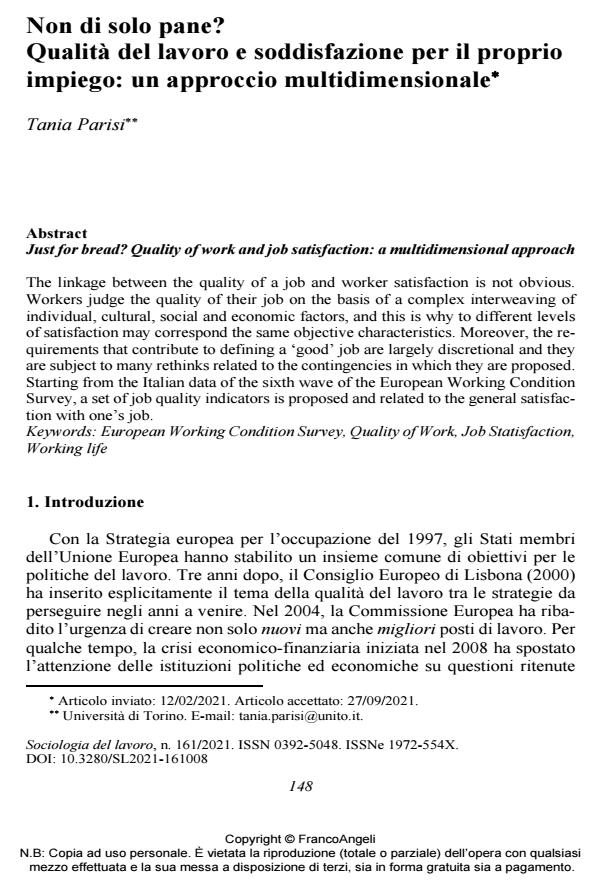Non di solo pane? Qualità del lavoro e soddisfazione per il proprio impiego: un approccio multidimensionale
Titolo Rivista SOCIOLOGIA DEL LAVORO
Autori/Curatori Tania Parisi
Anno di pubblicazione 2021 Fascicolo 2021/161
Lingua Italiano Numero pagine 23 P. 148-170 Dimensione file 337 KB
DOI 10.3280/SL2021-161008
Il DOI è il codice a barre della proprietà intellettuale: per saperne di più
clicca qui
Qui sotto puoi vedere in anteprima la prima pagina di questo articolo.
Se questo articolo ti interessa, lo puoi acquistare (e scaricare in formato pdf) seguendo le facili indicazioni per acquistare il download credit. Acquista Download Credits per scaricare questo Articolo in formato PDF

FrancoAngeli è membro della Publishers International Linking Association, Inc (PILA), associazione indipendente e non profit per facilitare (attraverso i servizi tecnologici implementati da CrossRef.org) l’accesso degli studiosi ai contenuti digitali nelle pubblicazioni professionali e scientifiche.
L’interesse per la qualità del lavoro è nato attorno agli anni Sessanta del Novecento con una peculiare commistione tra scopi istituzionali e di ricerca. La questione di che cosa si intenda con qualità del lavoro è lontana dall’essere risolta. Anzitutto, le dimensioni rilevanti per la sua misurazione hanno ancora un carattere largamente stipulativo e sono soggette a molti ripensamenti legati alle contingenze in cui vengono proposte. Inoltre, affidarne la valutazione ai lavoratori coinvolge un complesso intreccio di svariati fattori: individuali, culturali, sociali ed economici. Il saggio adotta la prospettiva della soddisfazione dei bisogni degli individui attraverso il lavoro. A partire dai dati della sesta wave della European Working Condition Survey, l’autrice propone un set di indicatori di qualità del lavoro e li mette in relazione con la soddisfazione generale per il proprio impiego.
Parole chiave:European Working Condition Survey, qualità del lavoro, soddisfazione per il lavoro, vita lavorativa
Tania Parisi, Non di solo pane? Qualità del lavoro e soddisfazione per il proprio impiego: un approccio multidimensionale in "SOCIOLOGIA DEL LAVORO " 161/2021, pp 148-170, DOI: 10.3280/SL2021-161008